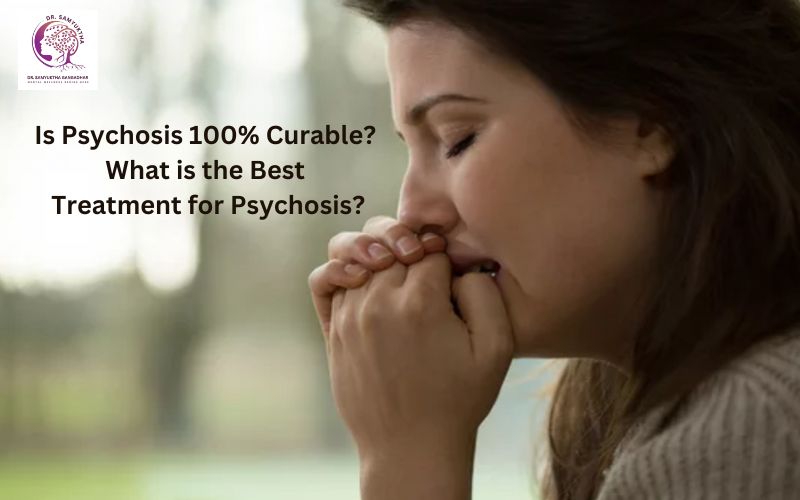Introduction
Psychosis is a severe mental health condition that distorts an individual’s perception of reality, leading to hallucinations, delusions, and disorganized thinking. It can be a symptom of underlying disorders like schizophrenia, bipolar disorder, or severe depression, making life challenging and confusing. A common question from patients and families is whether psychosis is 100% curable. This blog explores the curability of psychosis, the best psychosis treatment options available, and how Pushpa Mind Care, led by Dr. Samyuktha Gangadhar, M.D. (Psychiatry), recognized as the best psychiatrist in Kolkata and Bangalore, offers expert care to those dealing with this condition.
Understanding Psychosis: A Brief Overview
Before discussing the curability and treatment options for psychosis, it is crucial to understand what psychosis entails. Psychosis is not a disorder in itself but a symptom of an underlying mental or physical health issue. It can be triggered by a variety of factors, including:
- Mental health disorders: Schizophrenia, bipolar disorder, and severe depression are the most common causes of psychosis .
- Substance abuse: Alcohol, drugs like LSD, methamphetamines, or even certain prescription medications can induce psychosis .
- Medical conditions: Brain injuries, tumors, or neurological conditions such as Parkinson’s disease can lead to psychotic symptoms .
- Trauma: Severe emotional or physical trauma, especially during childhood, can increase the risk of psychosis .
Is Psychosis 100% Curable?
The question of whether psychosis is 100% curable is complex and depends on several factors, including the underlying cause, the duration of untreated psychosis, and the individual’s response to treatment.
Curability and Recovery

While psychosis can be managed effectively with treatment, claiming that it is 100% curable for everyone would be misleading. The outcome varies significantly from person to person. Some individuals may experience a single episode of psychosis that never recurs after treatment, while others may have recurring episodes throughout their lives. The key is to aim for remission and recovery, which can lead to a substantial improvement in quality of life .
- Complete Recovery: Some patients may fully recover from psychosis, especially if it is related to a one-time event such as substance-induced psychosis or a brief psychotic disorder. Early intervention and appropriate treatment can lead to a full recovery in these cases .
- Partial Recovery: In chronic conditions like schizophrenia, complete recovery might not be possible, but symptoms can be managed effectively with ongoing treatment, allowing individuals to lead fulfilling lives.
- Recurrence: For some, psychosis may recur despite treatment, requiring long-term management strategies.
The best approach to psychosis is to focus on treatment that aims at symptom management, minimizing the risk of recurrence, and improving overall functioning.
Best Treatment Options for Psychosis
The treatment of psychosis typically involves a combination of medications, therapy, and lifestyle changes. At Pushpa Mind Care, Dr. Samyuktha Gangadhar, M.D. (Psychiatry), widely recognized as the best psychiatrist in Kolkata and Bangalore, emphasizes a comprehensive and personalized approach to treatment, ensuring that each patient receives care tailored to their specific needs.
1. Medication
Medications, particularly antipsychotics, are the cornerstone of treating psychosis. These drugs work by altering the balance of chemicals in the brain, helping to reduce or eliminate psychotic symptoms. The choice of medication depends on the severity of the symptoms, the underlying cause, and the patient’s overall health .
- First-Generation Antipsychotics: These include drugs like Haloperidol and Chlorpromazine, which are effective but may have significant side effects.
- Second-Generation Antipsychotics: Drugs like Risperidone, Olanzapine, and Aripiprazole are often preferred due to their lower risk of side effects. They are equally effective in managing psychotic symptoms .
2. Psychotherapy
Psychotherapy, especially Cognitive Behavioral Therapy (CBT), plays a crucial role in the treatment of psychosis. CBT helps patients challenge and modify distorted thoughts and beliefs, improving their ability to cope with psychotic symptoms .
- CBT for Psychosis (CBTp): This specialized form of CBT focuses on addressing the symptoms of psychosis, helping patients understand their hallucinations or delusions and develop strategies to manage them.
- Family Therapy: Involving family members in the treatment process can provide patients with additional support, helping to create a stable and understanding environment that is conducive to recovery .
- Psychoeducation: Educating patients and their families about psychosis, its triggers, and its treatment can empower them to manage the condition more effectively.
3. Lifestyle Changes and Supportive Care
Lifestyle changes can significantly impact the management of psychosis. At Pushpa Mind Care, the treatment plan includes guidance on healthy living practices that support mental health .
- Stress Management: Stress can trigger or worsen psychosis. Techniques such as mindfulness, meditation, and relaxation exercises are taught to help manage stress levels .
- Healthy Diet and Exercise: A balanced diet and regular physical activity can improve overall well-being and support mental health .
- Sleep Hygiene: Quality sleep is essential for maintaining good mental health. Patients are educated on maintaining a regular sleep schedule and creating a sleep-friendly environment.
4. Support Networks and Rehabilitation

Recovery from psychosis often involves social and vocational rehabilitation. Building a strong support network, including peer support groups, and engaging in community activities can help patients regain confidence and reintegrate into society .
- Vocational Rehabilitation: Assisting patients in returning to work or finding new employment can boost self-esteem and provide a sense of purpose.
- Peer Support: Connecting with others who have experienced psychosis can provide invaluable emotional support and practical advice.
The Role of Early Intervention in Psychosis Treatment
Early intervention is crucial for successfully treating psychosis. The longer it goes untreated, the harder it becomes to manage, increasing the risk of long-term consequences. Research shows that early treatment improves outcomes, reduces symptoms, enhances functioning, and lowers the risk of relapse.
At Pushpa Mind Care, Dr. Samyuktha Gangadhar, one of the best psychiatrists in Kolkata and Bangalore, stresses the importance of recognizing early signs of psychosis and seeking prompt treatment, with programs focused on timely, comprehensive care.
- Reducing the Duration of Untreated Psychosis (DUP): Shortening the time between the onset of symptoms and the start of treatment is crucial for better outcomes .
- Comprehensive Assessment: A thorough assessment to determine the underlying cause of psychosis and tailor the treatment accordingly.
- Integrated Care: Combining medication, therapy, and lifestyle interventions from the onset to address all aspects of the patient’s condition .
Pushpa Mind Care: A Holistic Approach to Psychosis Treatment
At Pushpa Mind Care, led by Dr. Samyuktha Gangadhar, M.D. (Psychiatry), widely recognized as the best psychiatrist in Kolkata and Bangalore, the approach to treating psychosis is both comprehensive and compassionate. Understanding that each patient is unique, Dr. Gangadhar and her team develop personalized treatment plans that address the specific needs and challenges of each individual.
- Patient-Centered Care: The patient’s preferences, values, and needs are central to the treatment process, ensuring that they are actively involved in their care.
- Evidence-Based Treatment: The treatment approaches are based on the latest research and clinical guidelines, ensuring that patients receive the most effective care .
- Holistic Approach: Beyond treating symptoms, the focus is on improving the overall quality of life, helping patients achieve long-term recovery and well-being.
Conclusion
While psychosis may not be 100% curable for everyone, effective treatment can greatly improve symptoms and quality of life. At Pushpa Mind Care, led by Dr. Samyuktha Gangadhar, M.D. (Psychiatry) — recognized as the best psychiatrist in Kolkata and Bangalore — we offer comprehensive treatment that includes medication, therapy, and lifestyle changes.
If you or a loved one is struggling with psychosis, early intervention can make a significant difference. Consult with the best psychiatrist in Kolkata and Bangalore at Pushpa Mind Care, and let us support you on the path to recovery.


